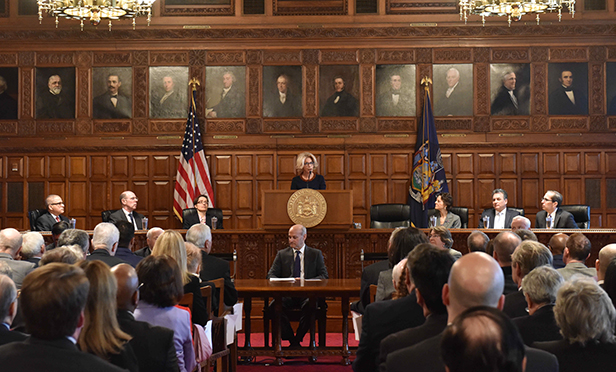 Chief Judge Janet DiFiore, surrounded by Court of Appeals judges and Chief Administrative Judge Lawrence Marks, delivers the State of the Judiciary address on Feb. 6. Photo: David Handschuh/NYLJ.
Chief Judge Janet DiFiore, surrounded by Court of Appeals judges and Chief Administrative Judge Lawrence Marks, delivers the State of the Judiciary address on Feb. 6. Photo: David Handschuh/NYLJ.
A commission created by Chief Judge Janet DiFiore wants to see major changes come to New York City’s housing courts. Yet as the commission notes in its new report detailing these changes, there’s been a long history of identifying problems with the courts that have remained in place despite previous calls for change.
But change is coming to the courts, thanks to the passage of the Universal Access to Legal Services law last year that will provide a right to counsel in the courts for low-income litigants. The five-year rollout means major changes to how the housing courts will operate when fully in place in 2020. While lauding these changes, the commission noted that the threat of taxing an already overcrowded docket could result in even more congestion and delays.
The report by the DiFiore-appointed Special Commission on the Future of the New York City Housing Court identified ways for the courts to be ready for universal legal access. It also aims to shed the perception—and to some degree the reality—of a second-class court system by implementing new policies and procedures to streamline proceedings and to demand greater professionalism and accessibility of the courts themselves.
Given the coming changes to representation for indigent clients, the commission recommended a number of procedural changes to the courts. Assignment of counsel should occur at the earliest possible time, in the hopes of early resolution and diversion of cases. Tenants should be informed of their rights through a public messaging campaign, as well as part of the court’s notice of petition. Counsel should regularly confer to extend the time before an answer is due to ensure attorneys and their clients are up to speed, the commission recommended, and attorneys should be able to represent their clients at hearings to allow for work and child care concerns.
These changes, however, come among a host of other upgrades the commission—chaired by Associate Justice Peter Tom of the Supreme Court, Appellate Division, First Department and retired state Supreme Court Justice Joan Lobis—says are critical for the housing courts.
Some of these are procedural moves the courts can largely make on their own. For example, the commission calls for a pilot project to stagger morning calendar start times, rather than the current 9:30 a.m. flood that inundates courts. A number of other moves, however, require different parts of the government to move forward.
In particular, the commission points to the long-overdue relocation and redesign of housing court facilities. Holding court parts in hallways, or the lack of judges’ chambers represent significant strains on the courts. With universal access looming, they may prove to be simply unsustainable. Brooklyn’s housing court deficiencies have been known for two decades, the commission notes, “without any remedial changes.” The city owns and maintains the housing court facilities, and some plans for improvements have been identified, such as the move in the Bronx to a larger facility at 851 Grand Concourse. The commission urged these plans “be completed without delay and that other design problems be addressed promptly.”
The report also focused on the court’s personnel and the need to make changes to not only the pure number involved, but to how they operate as well. Unsurprisingly, the report urged the required legislative move to increase the total number of judges from 50 to 60, and asked that their terms increase from five to 10 years. Court staff, including court attorneys and clerks, needs to increase as well, the commission stated—another request of state government.
But the commission also urged that the workforce, including those on the bench, receive training and practice to make the courts a more equitable and professional environment. Defaults should be meted out in a more timely fashion, and done so as not to appear to favor either side. Unrepresented litigants need to be treated more fairly, with court personnel better explaining the process, while certain practices that allow counsel to operate more freely in the courts than the unrepresented litigants must come to an end, the commission stated. It also stated that new training programs for judges and court staff to be better versed in substantive and procedural law, as well as in handling matters involving unrepresented litigants, are needed.
During her State of the judiciary speech Tuesday, DiFiore thanked the commission for “providing a strong vision and excellent direction for the future of the New York City Housing Court.” The courts were “wasting no time” in implementing the recommendations, with Chief Administrative Judge Lawrence Marks taking the lead.
“[T]he commission’s recommendations provide the road map we need to strengthen Housing Court operations and improve the efficiency and quality of the litigation experience,” DiFiore said.


